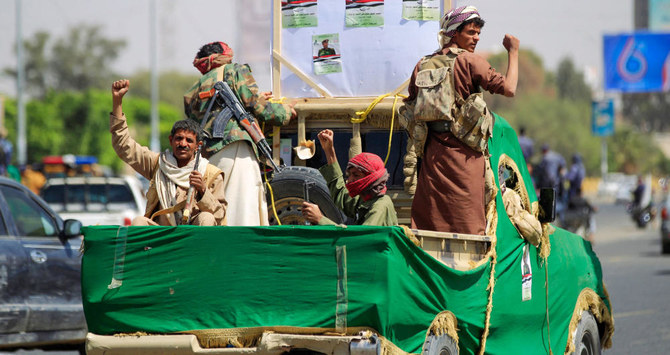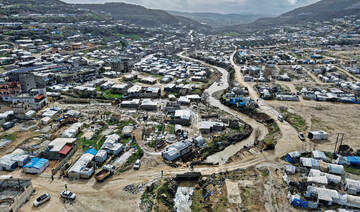AL-MUKALLA: The Iran-backed Houthis find themselves embroiled in a costly military quagmire in Yemen’s central province of Marib as their month-long offensive has stalled and they have not been able to recapture the province's capital.
The military deadlock has prompted the rebels into shifting their goal from taking Marib city to potentially using the offensive as a bargaining chip in future peace talks, Yemeni experts say.
“While the Houthis initially had momentum in their offensive on Marib, the battle has descended into a familiar stalemate,” Samuel Ramani, an international relations researcher at Oxford University, told Arab News.
“On March 14, reports from the Yemeni government suggested that the Houthis were losing ground and that the government forces were turning the tide.”
Earlier last month, thousands of Houthi fighters, including elite forces, rolled into Marib province from three directions: Sana’a, Jouf and Al-Bayda. The rebels’ plan was to capture Marib, its oil and gas fields and expel the Yemeni government from its last bastion in the northern part of the country.
More than a month since the offensive began, the Houthis have lost hundreds of fighters and failed to make major advances toward the city of Marib, located about 75 miles east of Yemen's capital Sana'a.
“Houthis stumbled in Marib. Their offensive has been repelled,” Nadwa Al-Dawsari, a Yemeni conflict analyst and a non-resident scholar at the US-based Middle East Institute told Arab News.
Yemen experts argue that the Houthis, stuck deep in a military stalemate and increased fatalities, have dropped their goal of seizing Marib and could use the offensive as leverage at behind-the-scenes negotiations.
“There's a possibility the Houthis knew the probability of taking Marib was low, especially given the power of the tribes and the terrain, which exposes them to Saudi airstrikes,” Katherine Zimmerman, a fellow at the American Enterprise Institute, told Arab News.
“They may be seeking to use their new positions as a bartering chip at future negotiations.”
Despite pushing back consecutive Houthi assaults and inflicting heavy losses on them, the Yemeni government troops could not completely flush out the rebels from the city and surrounding areas.
The rebels are still close and pose a threat to the city, experts say.
“They are still sending reinforcements. While their offensive was stalled by the tribes and government forces, they are still a threat to Marib,” Al-Dawsari said.
The city’s geographical and societal natures, in addition to massive military support from the Arab coalition, have played roles in foiling the Houthi offensive.
The rebels’ assaults have pushed Marib’s powerful tribesmen into joining the battlefields and standing by the Yemeni army.
The province’s mountainous terrain has exposed rebel fighters to Saudi airstrikes, Zimmerman said. Experts and local government officials say that warplanes from the Arab coalition have disrupted Houthi attacks, targeting military reinforcements to the battlefields.
The coalition even published videos showing warplanes attacking Houthi military fighters, tanks and military equipment in Marib’s mountain and desert regions.
Marib’s governor, Sultan Al-Arada, said the Houthis would have successfully invaded the city if the warplanes did not take part in the fighting.
“The situation would have been different,” Al-Aradah said during an online press conference arranged by the Sana’a Center For Strategic Studies earlier this month.
Yemen experts predict three scenarios for the post-Houthi offensive on Marib: the Yemeni government forces and the Houthis plunge deeper into a military stalemate, the rebels break through and take full control of Marib, or the government forces completely push the rebels out of the Marib province.
The outcome of the offensive could decide the trajectory of the country’s political and military courses.
“If Houthis take Marib, the political process will officially collapse,” Al-Dawsari said. “Already, the rebels have demonstrated a lack of interest in political negotiations. They want an end to Saudi airstrikes and military intervention but they are not really interested in reaching a political agreement with other actors.”
But if the Houthis fail to capture Marib, they might pause the offensive and engage in talks with their opponents to buy time and regroup forces before renewing strikes.
“The unreliability of the rebels as peace partners makes it difficult to predict their response to a failed offensive in Marib,” Ramani said. “They might engage in dialogue with Saudi Arabia, perhaps facilitated by Oman, just to buy time and then escalate again.”
















